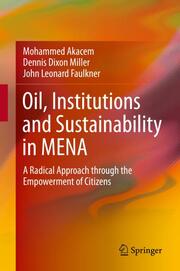Detailansicht
Oil, Institutions and Sustainability in MENA
A Radical Approach through the Empowerment of Citizens
ISBN/EAN: 9783030259310
Umbreit-Nr.: 7678143
Sprache:
Englisch
Umfang: xvi, 235 S., 49 s/w Illustr., 12 farbige Illustr.,
Format in cm:
Einband:
gebundenes Buch
Erschienen am 20.03.2020
Auflage: 1/2020
- Kurztext
- This book discusses and analyzes the major problems confronting the governments of the MENA region, and makes the case why the status quo is unsustainable. These problems include the many institutional deficits in MENA, i.le. the development of new technologies for alternative and renewable energy sources, efforts to use less oil to mitigate climate change, limited arable land to feed rapidly growing populations, youth unemployment, and dependence on oil exports due to lack of diversified economies and lack of favorable business climates. The authors argue that while, historically, oil revenues may have contributed to the maintenance of corrupt institutions and rent seeking among oil-rich nations, the mere presence of such valuable natural resources need not be the problem. For the spirit of the Arab Spring to be successful, the authors posit that the region must adopt significant institutional changes that embrace the rule of law, transparency, democratic accountability, and the protection of human and private rights. To facilitate institutional reform, the authors propose a plan of citizen empowerment that would enable a more equitable use of oil wealth, leading to more economic and political stability and sustainability. This book is appropriate for students of economics as well as researchers and policy analysts of energy and the economies of MENA.
- Autorenportrait
- Mohammed Akacem teaches economics at Metropolitan State University of Denver. His areas of research interests and teaching are Political Economy of the Middle East and North Africa as well as the Geopolitics and Economics of World Oil Markets. In addition to teaching, Professor Akacem has published his research in refereed and policy journals such as the Journal of South Asian and Middle Eastern Studies, Middle East Policy, Review of Islamic Economics, The Journal of Private Enterprise, OPEC Review and the Journal of Energy and Development. Dennis Dixon Miller holds the Buckhorn Endowed Chair in Economics at Baldwin Wallace University. While in graduate school he took a break to teach at the American University in Cairo, Egypt, 1982-84, and worked at both the Center for Energy and Economic Development and the Behavioral Science Institute at the University of Colorado where he earned his Ph.D. in economics in 1985. His teaching and research interests include environmental and natural resource economics and economic development. He has one honorary doctorate. He received a research scholarship at the Hoover Institute at Stanford University in 1986. He has received two year-long Fulbright Teaching Fellowships, both in Ukraine. John Leonard Faulkner graduated with a Ph.D. in Economics from the University of Colorado in 1984. He also holds a B.S. in Mechanical Engineering from the University of Colorado and an M.B.A. from the University of Michigan. His main interests and fields in economics are environmental and natural resource economics and public finance. From 1989 to 2013 he worked at the U.S. Environmental Protection Agency.
